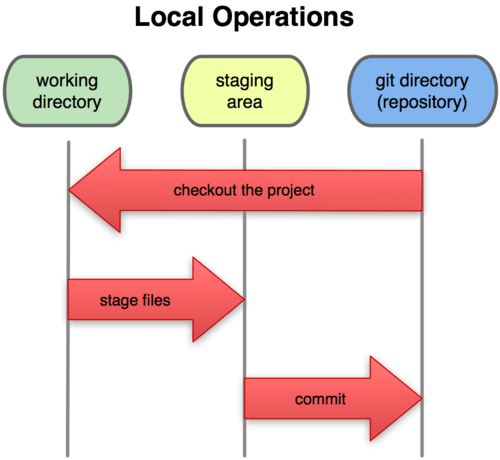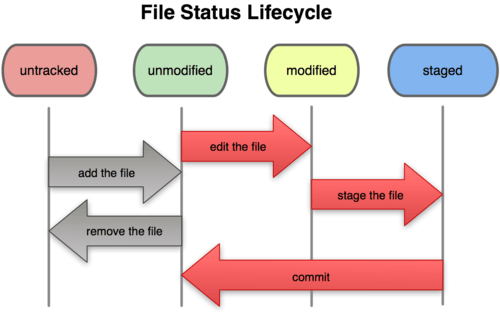Git overview: Operation and File lifecycle
Image are hotlinked from Pro Git book, written by Scott Chacon.Some of the commands listed here may use alias and/or configuration defined in ~/.gitconfig (see near the end of the post).
General operations
- Help with git:
git --help # List available git commands git help <command> # More details about a specific command git <command> --help # More details about a specific command - Display status of (local) repository:
git status git st # Abbreviated using ~/.gitconfig git status -sb # Shorter output git status -uno # Hide details of untracked files - Adding files to staging area:
git add --dry-run <file1> <file2...fileN> # Dry run. No change in repository git add -n <file1> <file2...fileN> # Abbreviated flag for dry run git add <file1> <file2...fileN> # Add files to staging area git add *.m *.txt # Also supports wildcards - Commit changes with message:
git commit -m 'message' # Commit ONLY staged files git commit -a -m 'message' # Commit ALL changes, including unstaged files git ci 'message' # Abbreviated using ~/.gitconfig
Compare and inspect
- Changes in working directory:
git diff --color # Colored diff git diff --stat # Show diffstat git diff --ignore-all-space # Ignore all whitespace git diff -w # Abbreviated --ignore-all-space git diff --ignore-space-changes # Ignore change in amount of whitespace git diff -b # Abbreviated --ignore-space-changes git diff -w --color-words # Colored word diff (rather than line diff) ignoring whitespace git diff --cached # Show changes in staged files git diff --staged # Same as --cached - Inspect changes:
(gitk is a tcl/tk based gui; Beginner tutorial)gitk --all # Browse all branches in local repository git log --oneline --graph # Inspect repository with summary of changes git log --oneline --graph --stat # Inspect repository with diffstats git whatchanged --oneline --graph # Similar to git log git lg # Abbreviated using ~/.gitconfig git show <commit> # Shows details of changes in commit - Inspect changes beyond file renames:
(Take care with renames: NEVER commit renames and modifications in the same commit. Check these as well.)git log --oneline --follow <filename> # Summary of changes git log --follow -p <filename> # Detailed changes gitk <filename> # Detailed changes using gitk
Branching
- Pro Git book has an excellent chapter on Branching and Merging.
- When typing in the name of a branch in following commands, try using TAB for auto-completion. It works most of the times.
git branch # List local branches git branch -a # List all local and remote branches git checkout <branch_name> # Switch to other existing branch git checkout -b <branch_name> # Create a branch and switch to it git branch -d <branch name> # Delete a branch- Compare branches: (order of branches matter)
git diff <branch1>..<branch2> git diff --stat <branch1>..<branch2> # Generate diffstat git diff --name-status <branch1>..<branch2> # Short diff with only name and status git diff <branch1> <branch2> <filename> # Show differences only for a file git difftool <branch1> <branch2> <filename> # Use (external) diff tool - Compare directories (branches/commits): (requires git version >=1.7.10)
git difftool --dir-diff <commit1>..<commit2> git difftool --dir-diff <commit1> git difftool --dir-diff <branch1> git difftool --dir-diff <branch1>..<branch2> - Remote branches & its management
A very good and detailed description of remote branch management can be found in Pro Git book.# Pushing to remote git push origin localBranch # Pushes localBranch to origin git push -u origin localBranch # Pushes/sets association of localBranch to origin git push origin localBranch:remoteBranchName # Pushes localBranch to origin/remoteBranchName git push -u origin localBranch:remoteBranchName # Similar effect to -u above # Tracking or defining association. Also see this. git branch -u origin/remoteBranchName # Associates current branch to origin/remoteBranchName git branch -u origin/remoteBranchName localBranch # Associates localBranch to origin/remoteBranchName # Checking out from remote git fetch origin && git checkout remoteBranchName # Checkout origin/remoteBranchName git checkout -b localBranch origin/remoteBranchName # Checkout origin/remoteBranchName to localBranch git pull # Works after checking out or associating. # Deleting remote branch git push origin :remoteBranchName # Deletes origin/remoteBranchName git push origin --delete remoteBranchName # Deletes origin/remoteBranchName # Prune stale branch. See git remote branch deleted but still appears in 'branch -a' git remote prune origin # Removes all stale branches git fetch -p # Fetches from origin and prunes all stale branches # Show details of branch tracking information git remote -v show origin git branch -vv -a
Merge conflicts
Good read about three-way merge in git: Painless Merge... and Three way git... Here is a summary:- Use git mergetool with meld. See ~/.gitconfig below. Mergetool would go through the conflicting files and create various new files with different file extensions so that it can use following command with meld (see git source code for more details).
meld --output $MERGED $LOCAL $BASE $REMOTE - $LOCAL: Contents of the file on the current branch. This is presented in Left-most column in meld.
- $REMOTE: Contents of the file to be merged. Right-most column in meld.
- $BASE: Common base of the merge OR half-finished merge where things started to fail. It is shown in middle column in meld. This is column which you would want to edit.
- $MERGED: File to which meld would write the merge resolution. It is not shown in meld. However, when $BASE is saved after editing, the output is written to $MERGED. Usually, $MERGED does not have any special extension like above files.
- Mergetool creates *.orig backup files while resolving merges. These are safe to remove once a file has been merged.
Tagging
- Create/Delete tags (Also see Pro Git book)
git tag -a v1.4 -m 'my version 1.4' # Creates annotated tag to current commit git tag -a v1.4 -m 'my version 1.4 <checksum> # Adds tag to an older commit git tag -d <tag_name> # Deletes a tag - List tags
git tag -l # Lists tags in alphabetical order git tag # Lists tags in alphabetical order git tag -l -n1 # Lists tags along with annotation git tag -l <pattern> # Lists tags in matching a pattern git tag -l v13* # Lists tags starting with v13 git log --tags --simplify-by-decoration --pretty="%d" # Lists tags in chronological order git tl # Abbreviated by ~/.gitconfig git show <tag_name> # Show details of a tags - Remote tags
git ls-remote --tags origin # List all tags on origin git push origin <tag_name> # Push a tag to origin git push origin --tags # Push all tags to origin git push origin :refs/tags/<tag_name> # Delete a tag on origin
Others:
- Revert changes (excellent examples in git-reset documentation)
git reset # Undo all add. Retains all changes in working tree git reset --hard # Undo add all. Discards all changes in working tree git reset HEAD <file_name> # Undo add one file. Retains all changes in working tree git reset --soft HEAD^ # Undo last commit. Retains all changes in working treeuncommitted (un-stage) all changes including files and folders:
~/.gitconfig
git difftool falls back to git mergetool config variables when the difftool equivalents have not been defined. If a merge resolution program is not specified, git mergetool will use the configuration variable merge.tool.[core]
editor = emacs
autocrlf = input
[merge]
tool = meld
[alias]
ci = commit -a -m
st = status -sb
rb = rebase
lg = log --graph --all --format=format:'%C(auto)%h (%cd)%C(reset)%C(bold red)%d%C(reset) %C(bold green)%s%C(reset) %C(bold white)- %cn%C(reset)' --abbrev-commit --date=short
df = diff -w --color-words
dft = difftool -y
tl = log --tags --simplify-by-decoration --format=format:'%C(auto)%h (%cd) -%C(reset)%C(bold red)%d%C(reset) %C(bold white)- %cn%C(reset)' --date=short --author-date-order
[color]
ui = true
[color "status"]
added = yellow
changed = red
untracked = cyan
[push]
default = current
Other great Git references:
- Pro Git book is a great reference to learn Git. Many of above commands are derived it.
- git ready provides tonnes of great git tips for all level of users.
- Visual Git Reference is another (short) reference to get idea and basics of Git.
- Git immersion is a full length Git tutorial starting from very basic.
- GitRef provides a quick reference to Git's syntax.
- Andrew Peterson's interactive Git cheat sheet.
- Another very extensive cheat sheet.

